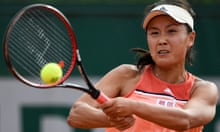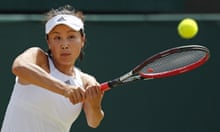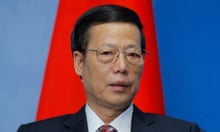Boycotting the Beijing Winter Olympics in February may seem a simple, symbolic diplomatic gesture – when put alongside the allegations of labour camps in Xinjiang province and the apparent sexual exploitation of the Chinese tennis star Peng Shuai – but such is the contemporary economic power of China that the step will only be taken after much agonising.
The threats and economic boycotts that Australia, Canada and more recently Lithuania have suffered at the hands of the Chinese for challenging Beijing’s authority in one way or another are not experiences other countries will want to copy lightly.
The west has always argued that its secret weapon against China is the strength of its alliances. China, by contrast, has no friends. So if a boycott is to happen – by, for instance, withdrawing ambassadors, royalty and ministers from the ceremonial events – countries will want to know that the big players in the G7 economies are signed up.
An incoherent response will only underline the west’s lack of resolve. At the moment, Joe Biden has said he is considering a boycott. That seemed surprising, because after his three-hour phone call with Xi Jinping last week, the short-term trajectory of US relations with China seemed to be towards greater contact, albeit guarded.
Kurt Campbell, the Indo-Pacific director at the national security council, in an address last week placed great emphasis on establishing lines of communication with Beijing. He also said that as China became ever more centralised, a premium would be placed on relations between the two presidents.
With issues such as freedom of navigation in the South China Sea, the independence of Taiwan, suppression in Hong Kong, or China’s unexpected advance in hypersonic nuclear missiles in play, it may seem unwise to offend Beijing over relatively trivial issues such as the number of US dignitaries that go to watch John Shuster competing to retain his gold for US curling in 2018.
These slights are taken very seriously in nationalist China – and if Beijing has shown one trait recently, it is its determination to retaliate if it feels it has been treated unfairly.
Since it regards the Olympic Games as “a rite of passage for China as a mature major power”, it has been working the diplomatic circuit successfully to gain support. The leaders of the G20 at their meeting in Rome jointly declared they “look ahead to Beijing Winter Olympics and Paralympics 2022, as opportunities for competition for athletes from around the world, which serves as a symbol of humanity’s resilience”.
But amid the fallout over Peng, there is a renewed US political constituency led by Republican figures such as Mike Pompeo and Ted Cruz that favours a complete boycott by sports stars, not just officials. It is hard for the Democrat administration to declare a genocide under way in Xinjiang, and then say “let the Games commence”. Much will depend on whether further convincing evidence emerges of Peng’s state of mind.
A swing vote is likely to be Germany, which under Angela Merkel was the lead European investor in China and lead advocate of engagement. Merkel has said the Olympics issue is for the next government: if the Greens claim the foreign ministry as forecast, the Olympics will be an early test of who makes the foreign policy decisions in the coalition.
But what may drive governments these days is the opinions of star athletes, with their huge social media followings and relative immunity from Chinese threats. As long as the issue is one of solidarity with a fellow athlete, the stars will push sports diplomacy in the direction of confrontation with China.
That will put pressure on the commercial sponsors, although few at this late stage are likely to withdraw. The fear of China’s power in the commercial sector was underscored by a recent Axios report revealing the Marriott hotel in Prague had turned down a chance to host the World Uyghur Congress, allegedly for fear of offending Beijing.
The UK, with one economic engine gone missing due to Brexit, is not keen to lose the other through Chexit, at least until other markets have been established in south-east Asia. Johnson secured few favours from the Chinese at Cop26 on the climate crisis, but his natural stance is to oppose sports boycotts as self-defeating. His instinct is that sports diplomacy should help, not hinder, relations.
In a report this year, the all-party Commons foreign affairs select committee proposed a nuanced package including: “The government should suggest the British Olympic Association does not participate in the opening or closing ceremonies, beyond one representative carrying the union flag. It should abstain from sending government officials to any ceremonies or functions, strongly discourage UK businesses from sponsoring or advertising at the Olympics, encourage fans and tourists to stay away, and discourage athletes from supporting or accepting the Chinese government’s propaganda efforts while in-country.”
In its response in November, the government committed to nothing. Similarly, it said an urgent review started on 12 January of export controls as they applied specifically to Xinjiang had not yet finished its “urgent work”.
Johnson will want to pick his fights with China, and despite a vociferous backbench lobbying group and a foreign secretary in Liz Truss inclined to rattle cages, it will be a surprise if the British are first in line to propose a substantial boycott.








